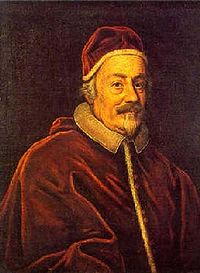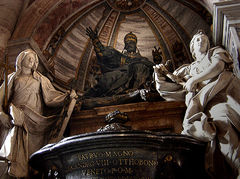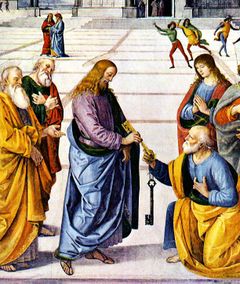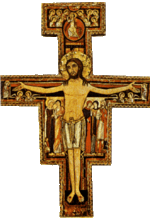Pope Alexander VIII
| Alexander VIII | |
|---|---|
 |
|
| Papacy began | 6 October 1689 |
| Papacy ended | 1 February 1691 |
| Predecessor | Innocent XI |
| Successor | Innocent XII |
| Personal details | |
| Birth name | Pietro Vito Ottoboni |
| Born | April 22, 1610 Venice, Republic of Venice |
| Died | February 1, 1691 (aged 80) Rome, Papal State |
| Other Popes named Alexander | |
Pope Alexander VIII (22 April 1610 – 1 February 1691), born Pietro Vito Ottoboni, was Pope from 1689 to 1691.
Contents |
Early life
Pietro Ottoboni was born of a noble Venetian family, and was the son of Marco Ottoboni, chancellor of the Republic of Venice. His early studies were made with marked brilliancy at the University of Padua, where, in 1627, he earned a doctorate in canon and civil law.
Governor of Terni, Rieti and Spoleto
He went to Rome during the pontificate of Pope Urban VIII (1623–44), and was made governor of Terni, Rieti, and Spoleto. For fourteen years he served as auditor of the Rota. At the request of the Venetian Republic, Ottoboni was made Cardinal-Priest of San Salvatore in Lauro by Pope Innocent X (1644–55) in 1652, and was later given the bishopric of Brescia, in Venetian territory, where he quietly spent the best years of middle life.
Pontificate
| Papal styles of Pope Alexander VIII |
|
|---|---|
 |
|
| Reference style | His Holiness |
| Spoken style | Your Holiness |
| Religious style | Holy Father |
| Posthumous style | None |
The ambassador of Louis XIV of France (1643–1715) succeeded in procuring his election on 6 October 1689, as successor to Pope Innocent XI (1676–89); nevertheless, after months of negotiation Alexander VIII finally condemned the declaration made in 1682 by the French clergy concerning the liberties of the Gallican church.
Alexander VIII was almost an octogenarian when elected to the papacy, and lived but sixteen months, during which time little of importance was done. Louis XIV, whose political situation was now critical, profited by the peaceful dispositions of the new pope, restored Avignon to him, and renounced the long-abused right of asylum for the French Embassy.
Financial controversies
Charities on a large scale and unbounded nepotism exhausted the papal treasury, reversing the policies of his predecessor. Among the various nominations, his 22-year-old nephew Pietro was made cardinal, nephew Marco was made Duc of Fiano, and nephew Antonio Church was made general. Out of compassion for the poor of the impoverished Papal States, he sought to help them by reducing taxes. But this same generous nature led him to bestow on his relations the riches they were eager to accumulate; on their behalf, and to the discredit of his pontificate, he revived sinecure offices which had been suppressed by Innocent XI. He bought the books and manuscripts of Queen Christina of Sweden for the Vatican Library. Alexander VIII assisted his native Venice by generous subsidies in the war against the Turks, as well as sending seven galleys and 2,000 infantry for the campaign in Albania.

In 1690 he condemned the doctrines of the so-called philosophical sin, taught in the Jesuit schools. That year he also canonised St. John of God.
Alexander VIII died on 1 February 1691. His tomb in St. Peter's was designed by Count Arrigo di San Martino and sculpted (1691-1725) by Angelo de' Rossi and Giuseppe Bertosi.
References
- Rendina, Claudio (1984). I papi. Storia e segreti. Rome: Newton Compton.
- Attribution
![]() This article incorporates text from a publication now in the public domain: Chisholm, Hugh, ed (1911). Encyclopædia Britannica (Eleventh ed.). Cambridge University Press.
This article incorporates text from a publication now in the public domain: Chisholm, Hugh, ed (1911). Encyclopædia Britannica (Eleventh ed.). Cambridge University Press.![]() This article incorporates text from a publication now in the public domain: Herbermann, Charles, ed (1913). Catholic Encyclopedia. Robert Appleton Company.
This article incorporates text from a publication now in the public domain: Herbermann, Charles, ed (1913). Catholic Encyclopedia. Robert Appleton Company.
External links
 "Pope Alexander VIII" in the 1913 Catholic Encyclopedia.
"Pope Alexander VIII" in the 1913 Catholic Encyclopedia.- Ottoboni family
| Catholic Church titles | ||
|---|---|---|
| Preceded by Innocent XI |
Pope 1689–91 |
Succeeded by Innocent XII |
|
|||||||||||||||||||||||||||||||||||||||||||||
|
|||||||||||||||||||||||||||||||||||||||||

